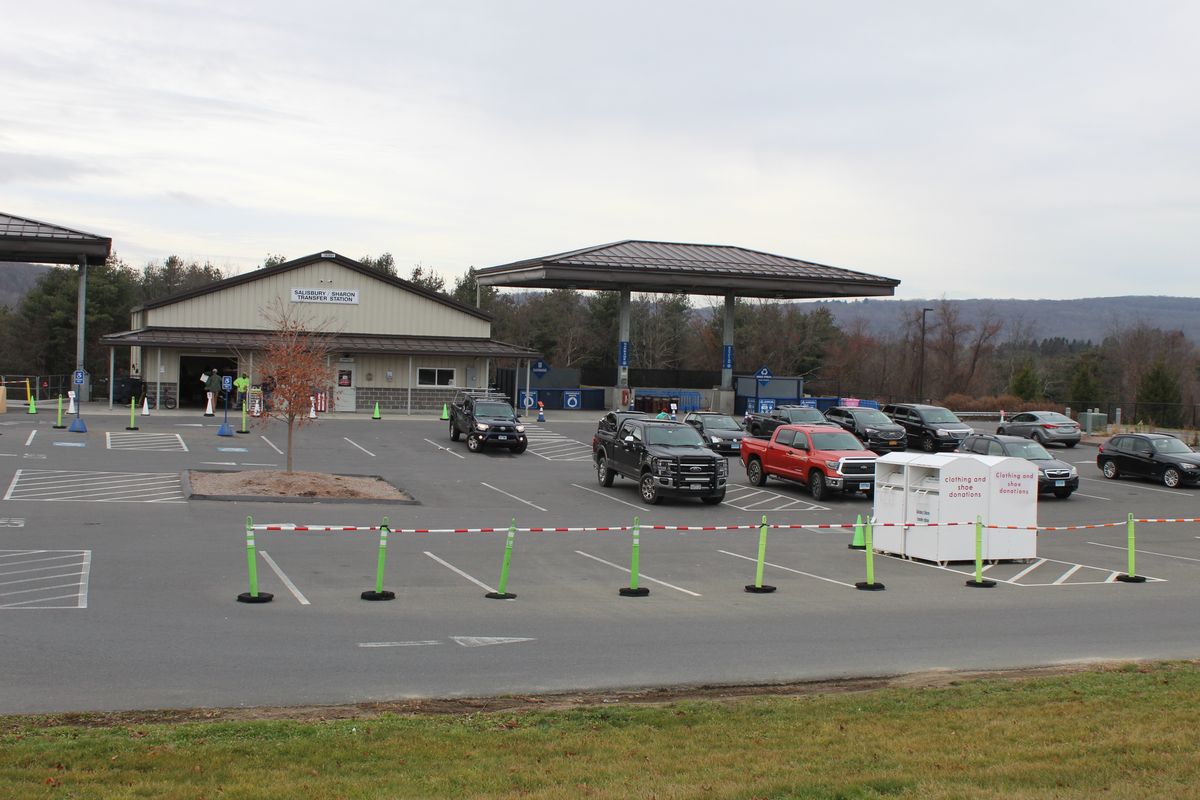Regional leaders seek waste solutions

The Salisbury-Sharon transfer station.
Patrick L. Sullivan

The Salisbury-Sharon transfer station.
Since the closure of Hartford’s waste-to-energy plant in July 2022, towns across the state have been forced to find independent solutions for trash disposal.
Municipal solid waste (MSW) contracts with the state are due to expire in June 2027, after which time, towns will be on their own when it comes to trash and recycling.
During the February meeting of the Northwest Hills Council of Governments (COG), held remotely on Zoom, first selectmen throughout the region discussed options for addressing the issue as a group.
“On a go-forward basis, we’re doing everything we can to solve this problem to make sure that we have capacity in place for our municipal solid waste to go,” said COG Chair Dan Jerram of New Hartford.
Jerram provided an update from the recently formed Municipal Solid Waste Subcommittee. As of the Feb. 7 meeting, about half of COG towns had no solutions in place for the dreaded 2027 expiration of disposal contracts.
COG has sought legal counsel on the viability of a regional ordinance to handle the issue.
Jerram reported the subcommittee suggested authorization for “the director to issue a non-binding letter of intent to the MIRA [Materials Innovation and Recycling Authority] Dissolution Authority expressing interest from the COG in the Torrington Transfer Station” and a separate ordinance “pursuant to the creation of a regional resource recovery authority, sometimes called a regional waste authority.”
The idea that COG could purchase the Torrington Transfer Station was proposed in the December 2023 meeting as a potential solution to the issue. Sending the MIRA Dissolution Authority a formal letter of intent would request information on the environmental status of the site to determine if it is a viable option for the COG to take over.
If remediation of the Torrington Transfer Station is necessary, it is the hope of the COG that funds from the MIRA Dissolution Authority could be used for environmental cleanup.
As for a regional waste authority, Jerram noted that one already exists with the Salisbury/Sharon Transfer Station. The ordinance model utilized in this joint operation could potentially be used as a rubric for the larger regional waste authority proposed by the subcommittee.
“Why reinvent the wheel?” asked Jerram.
Curtis Rand, first selectman of Salisbury, offered copies of the existing ordinance shared between Sharon and Salisbury for COG to review.
“Help yourself to any of it,” said Rand. “We can use any of it or none of it.”
Jerram noted the ordinance must be approved by every town that intends to use it.
“There could be long term strategy in everybody’s best interest,” said Jerram. “We are a team. We’re all in this together.”
Jerram requested COG Executive Director Rob Phillips set aside funds to retain a lawyer for review of the Salisbury/Sharon model. A draft ordinance for the broader goal would then be reviewed by each town leader.
Both recommendations from the subcommittee were approved by COG members unanimously.
“Time is our enemy here and we want to work as hard as we can to make positive progress at every meeting,” said Jerram.
Norfolk fire and ambulance crews responded to a one-vehicle crash on Route 272 (Litchfield Road) shortly after 6 p.m. Friday, Nov. 14.
NORFOLK — A 60-year-old Oregon man is dead after a single-car crash Friday, Nov. 14, according to Connecticut State Police.
Kevin Scott, of Portland, was driving a Ford Escape southbound on Route 272 (Litchfield Road) when he exited the roadway while negotiating a curve and struck a utility pole. The Ford rolled onto its side and the airbags deployed. No other vehicles were involved in the crash and there were no passengers in the car.
Jon Barbagallo, public information officer for Norfolk emergency services, said the roof of the vehicle had to be cut open so first responders could reach the driver. The extrication took about 10 minutes.
Scott was transported by Norfolk Ambulance to Charlotte Hungerford Hospital, where he succumbed to his injuries.
The utility pole snapped at its base.
Anyone with information on the crash is asked to contact Troop B at 860-626-1820.
WINSTED — Holy Cross High School won 36-20 against the Gilbert/Northwestern/Housatonic co-op football team Saturday, Nov. 15.
The hard-fought contest was won in the air. Holy Cross QB Brady Lombardo completed 16/31 passes for 309 yards with five touchdowns and one interception.
GNH pounded the ground game for a total of 209 rushing yards. Cole Linnen, Jaden Hoffman and Trevor Campbell each ran in one TD. Wes Allyn caught an interception on defense.

The result did not alter Naugatuck Valley League (Copper) standings with Holy Cross (6-3) remaining in third place and GNH (4-5) remaining in fourth place. Seymour and Woodland Regional sit tied at the top with undefeated 9-0 records ahead of their showdown Nov. 26.
GNH scored first against Holy Cross on a seven-yard rush by Jaden Hoffman. Holy Cross responded with three quick reception touchdowns -- two by Dae’Sean Graves and one by Devonne Drake -- before halftime, creating an 18-7 lead at the break.

In the third quarter, Trevor Campbell scored for GNH and Nathan Craft scored for Holy Cross.
Holy Cross added two more reception TDs in the final quarter with one by Aaden Hall and another by Drake. GNH’s Linnen scored a 31-yard touchdown run to bring the final score to 36-20.
The final regular season game for GNH will be the Turkey Bowl against St. Paul Catholic High School Wednesday, Nov. 26, at 6 p.m. in Bristol.

NEWTOWN — Housatonic Valley Regional High School's girls soccer team's state tournament run concluded in the semifinals with a 4-2 loss to Morgan High School Wednesday, Nov. 12.
The final four finish was the deepest playoff push for Housatonic since 2014. Lainey Diorio scored both goals and keeper Vi Salazar logged 10 saves in the semifinal game.
"It's an unfortunate loss but you know they played their hearts out," said HVRHS coach Don Drislane. "Awesome season."

It was the final soccer game for HVRHS’s two senior captains: Ava Segalla and Madeline Mechare. Segalla ended her varsity career as the leading goal scorer in school history with a total of 133.
Morgan's size and speed on the field helped the Huskies dominate possession and earned them a bid to the Class S girls soccer championship for the second year in a row. In 2024, Morgan lost in penalty kicks to Coginchaug High School.
This year, the Huskies will face Old Saybrook High School in the Class S championship game at Trinity Health Stadium in Hartford on Saturday, Nov. 15 at 10 a.m. Old Saybrook defeated Canton High School 1-0 in the semis.